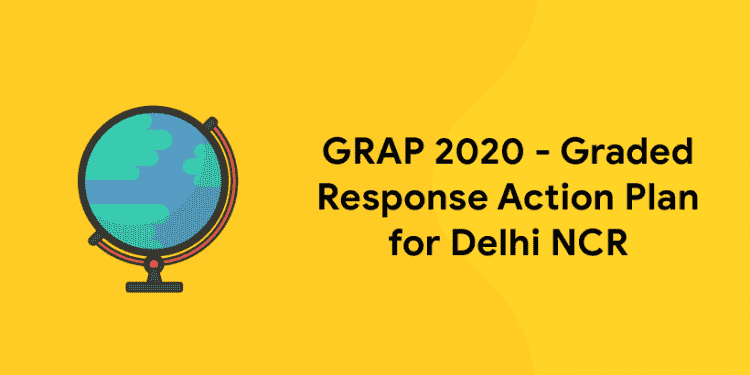Table of Contents
The capital city of our nation is the city experiencing the severe pollution in our country. Any actions, plans, mitigation methods as part of pollution control will be first reflected in the capital city itself. Delhi is the first region to impose the ban of 15-year-old vehicles in the public roads. Delhi is the first region to incorporate the BS VI emission norms into the vehicle production. New Delhi is the principal place of sitting of the National Green Tribunal (NGT). Delhi will be the start of spark for the pollution mitigation methods. In this scenario the central government has notified to shut down all the diesel generators in the Delhi NCR as part of the Graded Response Action Plan or GRAP. From October 15, all the diesel generators in the capital city will be banned as per the GRAP measures. Here we discuss what is GRAP and what all are its relevance in the present scenario. Let’s look into the all about the Graded Response Action Plan or simply GRAP.
What is GRAP Plan?
The history of the GRAP starts from the year of 2016. In November 2016, Delhi had a very immediate alarming pollution scenario of smog emergency after 17 years. The PM2.5 was 14 times the normal standards which were kept at that time. Pointing out the alarming situation the EPCA Environmental Pollution Control Authority which is working under the ministry of forest and environment filed an urgent report to the honourable supreme court. The report filed to the honourable supreme court in order to specify the need and requirement of the strict and emergency action plan implementation as per the direction of the supreme court. The honourable supreme court directed the EPCA and Central Pollution Control Board to frame a smog alert system. By analysing the world’s best schemes regarding the same matter, the agencies have regulated an action plan in order to mitigate the emergency situation. The action plan was submitted to the honourable supreme court and the supreme court directed the Ministry of Environment and Forest to notify the same. The central government thus notified the plan as the Graded Response Action Plan on 12th January 2017.
Enroll Entri for latest GK Updates
The GRAP Implementation
1: Who was the first woman President of India?
The GRAP is a strict action plan that is aimed at tackling the present emergency situation. The action plan is not aimed at formulating policies that are having long term effects. The immediate mitigation methods are the main objective of the plan. The actions will be headed and implemented by incorporating the various agencies and machineries of the state. The plan will be implemented according to the indication of the four stages of the Air Quality Index (AQI). The four stages that GRAP is concerned with is:
- Moderate to Poor
- Very Poor
- Severe
- Severe+ or Emergency
Click Here to Read the Environment Day its Celebrations and Themes
Free UPSKILLING Courses!
Take your first step toward mastering in-demand skills, acing interviews, and securing top-tier jobs with Entri's free upskilling courses.
Start Learning!Moderate to Poor Category
The Moderate to Poor condition of the pollution is considered by the AQI is falling in between the following bands. Poor – when PM2.5 levels are between 91-120 Micrograms per cubic meter or PM10 levels are between 251-350 micrograms per cubic meter. Moderate – when the levels are between 61-90 micrograms per cubic meter or PM10 levels are between 101-250 micrograms per cubic meter. The actions that are taken during this period is:
- Enforce garbage burning in landfills and other areas and heavy fines to the contrary.
- Enforce all pollution control measures in brick kilns and industries
- PCB monitoring in thermal power plan for strict pollution control measures
- Periodic mechanized sweeping in heavy traffic roads and water sprinkling in unpaved roads in every two days
- No tolerance for visible emission and heavy fines on the contrary
- Enforcement of PUC norms
- Enforce dust control in construction sites
- Deploy traffic police for smooth traffic flow
- Allowing the only trucks which are registered after 2005 to enter Delhi NCR
- Ban on firecrackers
- Watering of fly ash ponds in summer
Very Poor Category
Very Poor – when the levels are between 121-250 micrograms per cubic meter or PM10 levels are between 351-430 micrograms per cubic meter. The actions that are taken during this period is:
- Stop using diesel generators
- Enhance parking fee by 3-4 times
- Stop using fire woods or coals in hotels and open apartments
- Increase the bus and metro services by increasing the frequency
- Residential welfare association and individual to provide electric heaters during winter
- Strong alert in newspaper and other media
Severe Category
Severe – when the levels are above 250 micrograms per cubic meter or PM10 levels are above 430 micrograms per cubic meter. The actions that are taken during this period is:
- Close bricks kilns and hot mix plants and stone crushers
- Shutdown Badarpur thermal power plant and reduce other thermal power plant
- Intensify public transport by reducing the transport fee
- Increase the frequency of mechanised sweeping and water sprinkling in roads
Free UPSKILLING Courses!
Take your first step toward mastering in-demand skills, acing interviews, and securing top-tier jobs with Entri's free upskilling courses.
Start Learning!Severe+ or Emergency Category
Severe+ or Emergency – when the levels cross 300 micrograms per cubic meter or PM10 levels cross 500 micrograms per cubic meter. The actions that are taken during this period is:
- Stop the entry of all trucks except essential commodities
- Stop construction activities
- Introduce odd or even scheme for vehicle entry based on the number plate or licence
- Shutting down of schools if necessary, found by the task force.
Enroll Entri for latest GK Updates
Conclusion
From 15th October 2020 the central government has notified the ban of diesel generators in Delhi NCR as part of the GRAP so the Air Quality Index is in the very poor category. Delhi is just a start phase to all Indian states if we couldn’t be able to take advisory actions in our lifestyle to mitigate the pollution around us and sustain nature to give to our future generations. Hope that the environmental pollution can be controlled to a very good extent by these methods. For a competitive exam aspirant make sure you have grabbed the idea of the present mitigation methods and policies under the head of GRAP. Keep studying, keep winning!













